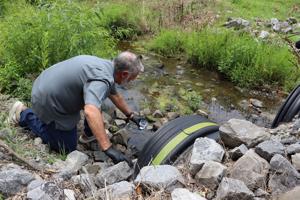The need for a universal ban on per- and polyfluoroalkyl substances, commonly referred to as PFAS or “forever chemicals,” has become increasingly urgent. With over 10,000 different types of PFAS used in a vast array of products ranging from nonstick cookware to fire-fighting foam, public health and environmental safety are at significant risk. Recent findings reveal that PFAS are pervasive, contaminating not only human blood and breast milk but also wildlife and water sources across the globe.
In the Netherlands, the National Institute for Public Health and the Environment recently issued warnings against consuming eggs from backyard chickens, citing high PFAS levels. Investigations suggest that earthworms, which hens often eat, may be contaminated. Environmental organizations such as Wildlife and Countryside Link and the Rivers Trust report that nearly all water bodies in England exceed proposed safety limits, with 85% containing PFAS levels at least five times higher than acceptable thresholds.
In France, authorities have banned tap water in 16 communes due to contamination. A report titled the Forever Pollution Project identified 23,000 contaminated sites across Europe, highlighting the widespread nature of this issue. The health impacts linked to PFAS are alarming, with connections to various cancers, fertility issues, and weakened immune systems.
Manufacturers’ Responsibility and Regulatory Challenges
The situation is reminiscent of the climate crisis, involving extensive lobbying and cover-ups by manufacturers such as 3M Co. and DuPont de Nemours Inc. Internal documents reveal that these companies were aware of the toxic effects of PFAS for decades yet failed to inform the public. In December 2022, 3M announced plans to phase out PFAS by the end of 2025, responding to mounting legal challenges that have cost the companies billions in settlements.
Despite a global PFAS market valued at just over $28 billion, the costs associated with remediation in the UK and Europe could reach €100 billion ($116 billion) annually if no immediate action is taken. This figure does not include healthcare costs, which the Nordic Council of Ministers estimates to be at least €52 billion each year.
While some corporations, such as outdoor retailer Patagonia and fast-food chain McDonald’s, have pledged to eliminate PFAS from their products, many others have shown resistance. A collaborative investigation by researchers, lawyers, and journalists uncovered a substantial lobbying effort to oppose proposed restrictions in Europe.
The Push for Comprehensive Legislation
Current regulatory measures are inadequate, focusing on piecemeal bans of specific PFAS types or certain sectors. Denmark will prohibit the import and sale of PFAS-treated clothing and shoes starting in July 2026, while France has already banned PFAS in various consumer product categories, excluding cookware after lobbying from manufacturers like Groupe SEB.
A significant step toward comprehensive regulation emerged in 2023 when five EU member states—Germany, the Netherlands, Sweden, Denmark, and Norway—submitted a proposal to the European Chemicals Agency. This proposal aims to regulate all PFAS as a group, adopting a precautionary approach rather than addressing each chemical individually. If approved, the new restrictions could take effect by 2028.
Despite these developments, progress in other regions remains slow. The UK government’s recent interim position on PFAS management has been criticized for failing to target all chemicals simultaneously. In the United States, the previous administration cut nearly $15 million in funding for PFAS research, while the Environmental Protection Agency has proposed rescinding drinking water limits for specific PFAS chemicals.
Even if a ban were enacted immediately, existing PFAS in the environment would persist. Nonetheless, evidence indicates that restrictions can lead to significant improvements. Following bans on PFOS and PFOA in Europe, a 2023 study showed a marked decline in blood concentrations of these chemicals in Denmark.
As the public grapples with the implications of PFAS exposure, it is crucial to move beyond temporary solutions and implement a comprehensive ban on these harmful substances. Immediate action is necessary to address the growing crisis and begin the long journey toward environmental recovery.
